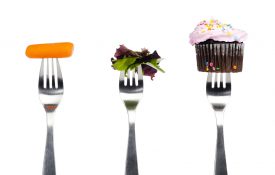-
10 Brilliant Strategies For Writing Viral Content
Forbes: There are certain websites, writers, marketers and content creators who seem to rule the internet. Everything they put out there seems contagious, capturing an audience of millions and sparking conversations on social media. These days, unpacking the secrets to viral success has been the mission of researchers, media organizations and businesses alike. After all, infectious content leads to major rewards in the form of readers, subscribers, advertisers, raising awareness for an important issue, brand recognition and financial success. If you’re looking for ways get people talking, check out these 10 strategies from the experts themselves. Read the whole story: Forbes
-

Processing Speed Helps Determine Whether We Choose Carrots Over Chocolates
Every January, many people pledge to make healthier food choices a priority for the upcoming year—swapping out that slice of chocolate cake for a bag of carrot sticks. But, keeping that healthy eating resolution isn’t
-
Dare to Dream of Falling Short
The New York Times: Ever hear the joke about the guy who dreams of winning the lottery? After years of desperate fantasizing, he cries out for God’s help. Down from heaven comes God’s advice: “Would you buy a ticket already?!” Clearly, this starry-eyed dreamer is, like so many of us, a believer in old-fashioned positive thinking: Find your dream, wish for it, and success will be yours. Not quite, according to Gabriele Oettingen, a psychology professor at New York University and the University of Hamburg, who uses this joke to illustrate the limitations of the power of positive thinking. In her smart, lucid book, “Rethinking Positive Thinking: Inside the New Science of Motivation,” Dr.
-
Why a hug is good for your health
The New Zealand Herald: If you're struggling to get your beloved under the mistletoe this year, then help is at hand. Scientists have revealed that hugging is good for our health, helping to prevent infection and relieve stress. They say just a cuddle or squeeze is enough to reduce illness symptoms and the more you do it, the greater the effect. Researchers from Carnegie Mellon University in the US quizzed 400 people about their personal conflicts and the sort of support they received. They then exposed them to a common cold virus and put them in quarantine.
-
What Is Fatigue?
The New Yorker: When, on a blustery day in Oxford in 1954, Roger Bannister ran the first sub-four-minute mile, measuring out the full capacity of his lungs and legs and collapsing across the finish line, he felt, as he later wrote, “like an exploded flashlight.” That was the feeling researchers were trying to evoke, recently, when they paid thirteen volunteers at Bangor University, in Wales, to pedal a stationary bike at a predetermined pace for as long as they could. Such “time to exhaustion” trials are a well-established method of measuring the limits of physical endurance, but in this case the experiment also had a hidden psychological component.
-
Why Americans care more about experiences than possessions
Quartz: The signifiers of success used to be simple. Own a home (or two) and a car (or two) and voilà! You’ve achieved the American Dream. Ownership, however, is a complicated concept for an increasing number of Americans (this writer and her sister, included)—and not for all the reasons you might think. Multiple studies and datasets have shown that millennials are not buying homes and they are not buying cars. In fact, they are not buying many big ticket items at all (save for their smartphones) in the way generations of the past have.

